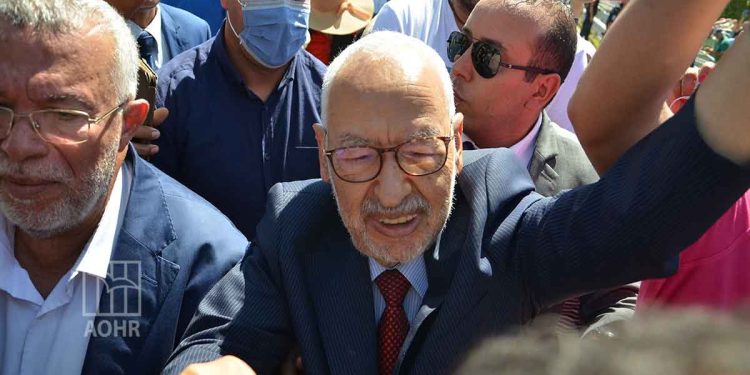The Court of First Instance in Tunis handed down severe prison sentences to 41 defendants in the case known as “Instalingo,” a digital content production company that was raided in 2021. The defendants faced charges related to undermining state security, money laundering, and incitement to violence—allegations that the regime often directs at its opponents.
The leader of the Ennahda Movement, Rached Ghannouchi, was sentenced to 22 years in prison, while the former Prime Minister Hichem Mechichi received a 35-year sentence.
Sentences were handed down against several political and media figures, including journalists Samia Ghannouchi (25 years in prison), Shahrazad Akacha (27 years), Shaza Al-Haj Mubarak (5 years), Lotfi Al-Haidouri (27 years), and Wadah Khanfar (32 years). Additionally, sentences were issued to politicians and former ministers, such as Rafiq Abdel Salam (35 years), Lotfi Zitoun (35 years), Sayed Al-Farjani (13 years), and Mohamed Ali Al-Aroui (13 years).
The list of convicts includes the following individuals and their respective sentences:
– Abdelkrim Suleiman: 14 years
– Salim Al-Jabali: 12 years
– Riadh Baltaib: 8 years
– Samia Al-Sabati: 10 years
– Tawfiq Al-Sabai: 8 years
– Ashraf Barboush: 6 years
– Habib Al-Sboui: 6 years
– Mehdi Al-Jamal: 6 years
– Lamia Al-Daadaa: 6 years
– Safinaz Benali: 6 years
– Ashraf Omar: 6 years
– Maryam Al-Daadaa: 6 years
– Ashraf Al-Khadhraoui: 17 years
– Hamdi Boumiza: 17 years
– Bashir Al-Yousfi: 27 years
– Mohamed Al-Hashfi: 25 years
– Samia Al-Khariji: 25 years
– Moaz Al-Khariji: 35 years
– Lazhar Longo: 15 years
The sentences issued represent an unprecedented escalation in the targeting of political opponents. This is particularly concerning as many of those accused were tried in absentia or chose not to appear before the judiciary, citing a lack of justice.
These sentences are also regarded as the most severe since the military trials aimed at the leaders of the Ennahda movement in the 1990s.
These trials are viewed as part of a wider strategy to undermine the political landscape and silence dissenting voices. This trend occurs amid increasing documented violations, such as restrictions on the press and campaigns to arrest opponents, bloggers, and activists.
The recent rulings highlight the worsening human rights crisis in the country following the “exceptional” measures implemented by President Kais Saied on July 25, 2021. These measures resulted in the dissolution of parliament and a consolidation of executive power, undermining the independence of the judiciary, which has now become a political tool for the regime. Authorities are using state security charges as a pretext to try political opponents, often without adhering to basic standards for fair trials.
The harsh sentences issued may signal the beginning of further repression, especially with the upcoming sessions of the so-called “conspiracy against state security” case, set to commence in March 2025. There are concerns that these sessions will lead to similarly severe sentences unless there is both local and international intervention to address the significant deterioration of the human rights situation in Tunisia.






























